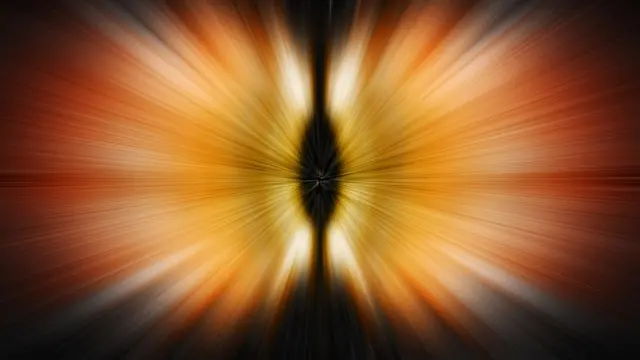Black holes have always been a source of fascination and mystery. These cosmic giants, with their ability to swallow light and matter, challenge our conceptions of physics and the universe. However, beyond their fearsome appearance, black holes pose an intriguing paradox that has puzzled scientists for decades: the Information Paradox.
This paradox, which lies at the core of our understanding of the universe, raises the question of whether or not information can be destroyed. According to the laws of quantum physics, information cannot be destroyed, but black holes seem to contradict this law, absorbing information and seemingly making it disappear. This contradiction has sparked a heated debate in the scientific community.
In this text, we will delve into the Information Paradox in black holes, examining its origin, its meaning, and the implications for our understanding of reality. We will explore the theories that have been proposed to resolve this paradox, as well as the challenges that these approaches present.
We will also consider how this paradox affects Einstein's theory of relativity and quantum theory, two fundamental pillars of modern physics. Is it possible that the black hole information paradox could force us to revise these theories and seek a new way of understanding the universe?
Finally, we will reflect on the current state of research on the Information Paradox and future prospects. Despite many advances in this field, the paradox remains an unsolved quantum challenge, keeping us on the edge of our seats in search of answers. Will we be able to solve this astronomical enigma? Join us on this journey through space and time to find out.
The information paradox of black holes
The black hole information paradox is one of the greatest puzzles of modern physics. This paradox arises from the incompatibility between the laws of quantum mechanics and those of general relativity, which predict different outcomes for the fate of information falling into a black hole.
According to Einstein's theory of general relativity, anything that falls into a black hole disappears forever and no information about it can escape. However, according to the laws of quantum mechanics, information is never lost.

The enigma of information loss
According to quantum mechanics, the evolution of a physical system over time is completely deterministic, meaning that if we know the state of the system at a given time, we can predict its state at any other time. This principle is called information retentionHowever, this seems to conflict with what happens when something falls into a black hole.
When an object falls into a black hole, all information about its physical properties is lost. From the point of view of an outside observer, it appears that the object and all its information have been lost forever. This is known as the problem of information loss in black holes, and is the root of the information paradox.
Hawking radiation and the information paradox
In the 1970s, British physicist Stephen Hawking proposed that black holes are not completely black, but instead emit a type of thermal radiation known as Hawking radiation. According to Hawking, black holes can lose mass and eventually evaporate completely through this radiation process.
The paradox sharpens
This idea that black holes can evaporate takes the information paradox to a whole new level. If a black hole can evaporate, what happens to all the information that had fallen into it? According to Hawking's theory, it seems that the information is lost forever, in clear conflict with the laws of quantum mechanics.
Perspectives for resolving the paradox
There are several proposals to resolve the information paradox in black holes.
- Information as a hologram: One proposal suggests that information about everything that falls into a black hole is encoded in its event horizon, the “no-return” surface surrounding the black hole. This idea is known as the holographic principle.
- Information on Hawking radiation: Another proposal suggests that information falling into a black hole gradually escapes through Hawking radiation.
- Quantum mechanics needs modifications: Some physicists suggest that the solution might require a revision of the laws of quantum mechanics.
The way forward
Despite various proposals, the black hole information paradox remains an unsolved puzzle in physics. Solving this problem will likely require a new understanding of the nature of black holes, gravity, and spacetime, and could have profound implications for our understanding of the universe.
Why is it important to resolve the paradox?
The black hole information paradox is much more than a theoretical puzzle. It is a direct challenge to our understanding of the fundamental laws of nature. Solving this paradox will not only shed light on the nature of black holes, but could also lead us to a unified theory of physics that combines general relativity and quantum mechanics – the holy grail of modern theoretical physics.

Conclusion
In short, the Black Hole Information Paradox remains one of the most intriguing enigmas of the universe. This phenomenon, despite the various theories that have been proposed, still challenges our perceptions of reality and the fundamental laws of physics.
The intersection of quantum theory and gravity, as evident in black holes, opens doors to new ways of understanding the cosmos. The dilemma of missing information, a supposed violation of the laws of quantum physics, still awaits a definitive solution. But is it really a violation, or is it an indication that our understanding of physics is incomplete?
The answer to the information paradox may not lie in quantum physics or the theory of gravity, but in some kind of unified theory that we have not yet discovered. What is certain is that the search for answers will continue, challenging our assumptions and pushing us to expand our knowledge of the universe.
Ultimately, the black hole information paradox shows us that we still have much to learn about the deepest mysteries of the universe. Despite our advances, we are still just observers, trying to understand the vast cosmos around us.


